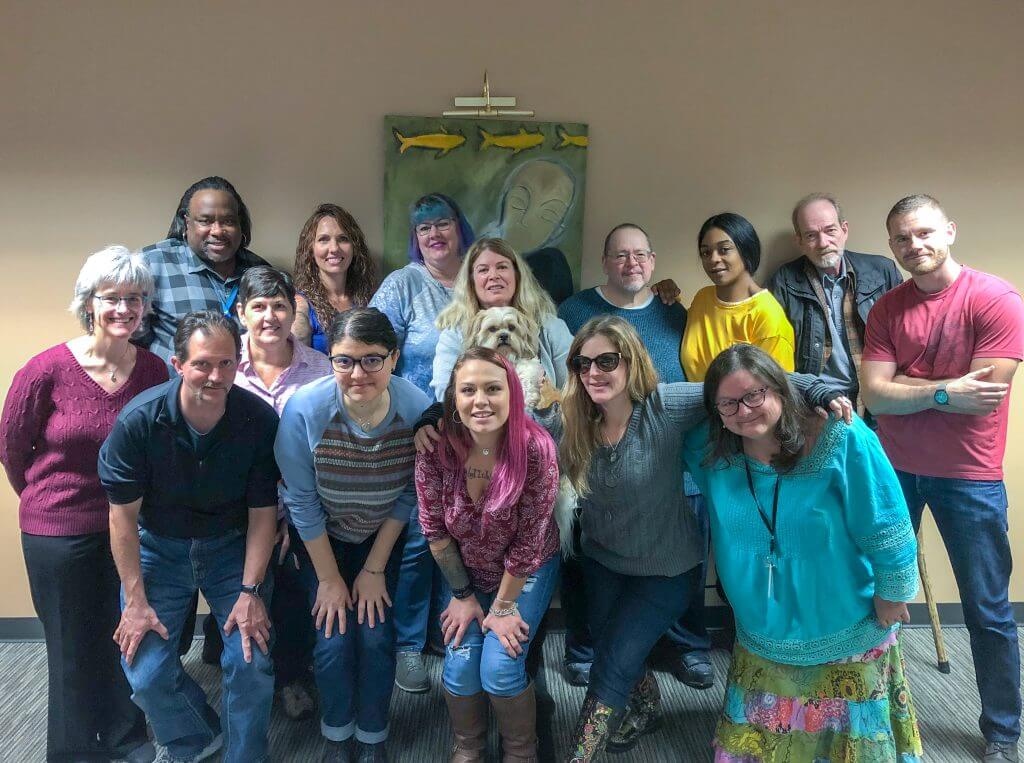December 6, 2018
Cascadia Provides Program Graduates Skills to Give Back to the Community
 Ramon Lowe ‘checks-in’ on Facebook at Cascadia Behavioral Healthcare’s Administrative building for every one of his Peer Support Specialist classes. Checking in is one way Ramon shows his commitment to the program and his passion for social services work.
Ramon Lowe ‘checks-in’ on Facebook at Cascadia Behavioral Healthcare’s Administrative building for every one of his Peer Support Specialist classes. Checking in is one way Ramon shows his commitment to the program and his passion for social services work.
“Most recently I worked for two years at Human Solutions as a Family Engagement Specialist at their homeless shelter. My experience being homeless, having an addiction, and having a mental health diagnosis led me to want to help others navigate through these issues.”
He learned about the peer support training through the Urban League of Portland, and through a partnership with Cascadia, Ramon’s program fees were waived.
A Peer Support Specialist (PSS) receives extensive training on a range of relevant topics to provide supportive services to current or former consumers of mental health or addiction treatment[1]. Each session consists of one 4-hour class, one 2-hour student facilitated lab, homework in the form of academic reading and writing, along with group and individual presentations. After completing all of the classes, graduates have the option of taking Cascadia’s Advanced Peer Wellness Specialist (PWS) course for free. If they are enrolled at Portland State University they are also eligible to receive up to 8 units of credit.
Ramon will gain many insights by the end of the class, and hopes to positively impact others by “increasing visibility and knowledge of mental health issues in the African American community,” Ramon said.
His favorite part of Cascadia’s PSS class is how the incorporation of personal experiences and anecdotes that come out during group discussions give him context to the technical information he reads in his textbook. “Connecting those personal experiences adds to the learning experience and deepens my passion for work in social services,” he said.
Cascadia’s PSS class, approved by the Oregon Health Authority, is an intensive program that teaches individuals who have lived experiences with mental health and/or substance use how to use that experience to advocate and support others dealing with similar challenges. During the class, trainees will learn how to help others achieve their whole health goals, create a connection between primary care and behavioral healthcare, balance physical and mental challenges, and build their own resilience and personal efficacy, all while helping clients integrate into the larger community.
Meghan Caughey, Cascadia’s Senior Director of Peer and Wellness Services developed the PSS training back in 2006 before she started working for Cascadia. Cascadia recruited Meghan to come and work for the organization in May 2011 and to bring her curriculum with her. Diagnosed with schizophrenia at age 19, Meghan struggled to see value in herself as a person, and as more than just a mental health diagnosis.
As part of her recovery, she turned her hardship into a positive for herself and the many others who have benefitted from receiving her training. She thinks Cascadia’s program is necessary for the Portland community, both for those providing help and those receiving it.
“People working in the program are living proof that it’s possible to thrive and give back to the community even when one has a behavioral health diagnosis,” Meghan said.
Meghan teaches the class that Ramon takes every week, and said that “Ramon has been a huge asset to the PSS class, showing the commitment, wisdom, and enthusiasm that will make his work as a PSS very powerful.”
She said that those who have completed the training are a strong symbol of hope, and are able to connect with individuals who may be reluctant to engage with a clinician. PSS and PWS can also offer services different from clinicians, such as going out for a walk or exercising with a client.
Reluctant to use the word stigma when addressing the topic of mental health, Meghan is hopeful that the “prejudice and discrimination surrounding mental health will diminish and people will be seen as a precious resource for our community and beyond”, noting that beliefs and attitudes are already moving in a positive direction.
Cascadia is one of the largest behavioral healthcare providers in Oregon, integrating mental and behavioral health, addiction treatment, and primary care. Those who graduate from Cascadia’s PSS training often continue to work at the organization or other state providers in the Peer Delivered Services programs, committing to supporting others in their journey anywhere from 10-40 hours per week.
Only 39 states across the nation offer Peer Specialist training programs; to date, Cascadia has trained over 200 individuals in Oregon, and over 10% end up working for Cascadia to serve some of the estimated 18,000 people who receive services through the organization every year.
[1] Oregon Health Authority
— written by Olivia Alley, Cascadia Behavioral Healthcare, External Communications
